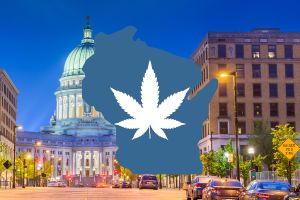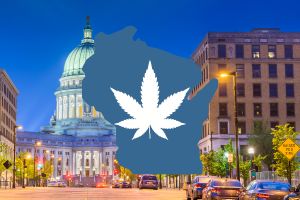Is CBD Flower Legal in Wisconsin?
Posted by Tweedle Farms on Apr 11th 2021

The Legal Landscape of Hemp in Wisconsin
The state of Wisconsin, known for its rich agricultural history and progressive approach to farming practices, has been a noteworthy participant in the resurgence of hemp cultivation and production within the United States. As we delve into the legal intricacies of hemp, particularly focusing on CBD flower, and recent newcomer THCA flower, it is crucial to understand the implications for both industry stakeholders and consumers navigating this evolving market.
Historical Context and Legal Framework
Hemp's journey in Wisconsin echoes the plant's tumultuous history in the United States. Following decades of prohibition, the 2014 Federal Farm Bill marked a pivotal moment by allowing states to initiate hemp research programs. Wisconsin responded by establishing its own pilot program in 2017, laying the groundwork for what would become a burgeoning industry.
The legal framework took a significant leap forward with the 2018 Federal Farm Bill, which descheduled hemp flower and its derivatives from the Controlled Substances Act, provided they contained no more than 0.3% THC on a dry weight basis. This distinction is crucial as it differentiates legal hemp from its psychoactive cousin, marijuana, based on THC content.
Wisconsin's Adaptation to Federal Changes
In alignment with federal legislation, Wisconsin updated its statutes to reflect the new stance on hemp. The state's Department of Agriculture, Trade and Consumer Protection (DATCP) oversees the regulation of hemp cultivation and processing, ensuring compliance with both state and federal laws.
Understanding Hemp Flower, CBD Flower, and THCA Flower
Hemp flower refers to the bud of the hemp plant, which is rich in cannabinoids and terpenes but low in THC. CBD flower, a subset of hemp flower, specifically denotes buds with high concentrations of cannabidiol (CBD), typically used for smoking or making pre rolls.
THCA flower introduces a more complex legal nuance. Tetrahydrocannabinolic acid (THCA) is a non-psychoactive precursor to THC found in raw cannabis plants. However, when heated, THCA converts to THC, the compound associated with marijuana's psychoactive effects.
Implications for Industry Stakeholders
For farmers and cultivators, navigating the legal landscape of hemp production in Wisconsin requires diligent compliance with state regulations, including licensing, testing, and reporting requirements. The DATCP's role is not only to regulate but also to support growers through educational resources and guidance, ensuring the sustainable growth of the industry.
Processors and retailers face their challenges, particularly concerning the marketing and sale of hemp-derived products. The FDA's stance on CBD, especially in dietary supplements and food, adds another layer of complexity, necessitating careful consideration of product labeling, health claims, and marketing strategies.
Consumer Considerations
Consumers, on the other hand, are met with an overwhelming array of hemp-derived products, from tinctures, topicals, and gummies, to pre-rolled joints and the raw CBD flower itself. The legal clarity surrounding these products is still somewhat murky, especially regarding their purported health benefits and the accuracy of their THC content labeling.
Legal Challenges and Advocacy
Despite the progress made, the hemp industry in Wisconsin, like elsewhere, faces legal hurdles. The ambiguous legal status of certain compounds, such as THCA, and the ongoing debate over the regulation of CBD products exemplify the challenges at hand.
Advocacy plays a vital role in this landscape, with industry stakeholders pushing for clearer regulations, research support, and public education to demystify hemp and its derivatives. Organizations like the Hemp Alliance of Wisconsin serve as pivotal platforms for advocacy, education, and collaboration among farmers, processors, retailers, and consumers.
Looking Ahead
As Wisconsin continues to navigate the complex legal and regulatory framework surrounding hemp, the future holds both promise and uncertainty. Ongoing research into hemp and its compounds, coupled with legislative developments, will shape the trajectory of the industry.
For stakeholders and consumers alike, staying informed, engaged, and compliant with current laws and regulations is paramount. The potential of hemp as a sustainable crop and a source of beneficial compounds is immense, yet realizing this potential hinges on a balanced approach that safeguards public health and fosters industry growth.
Conclusion
The legal landscape of hemp in Wisconsin is a dynamic and evolving narrative, marked by historical shifts, legal nuances, and the collective efforts of those involved in the hemp industry. From the fields of hemp cultivation to the shelves of retail stores, the journey of CBD flower through the legal and regulatory channels of Wisconsin underscores a broader dialogue about agriculture, wellness, and the complexities of modern legislation.
As Wisconsin and other states continue to refine their stance on hemp and its derivatives, the dialogue between regulators, industry stakeholders, and consumers will remain central to the harmonious growth of this ancient yet rediscovered crop. The path forward, paved with research, advocacy, and education, promises



